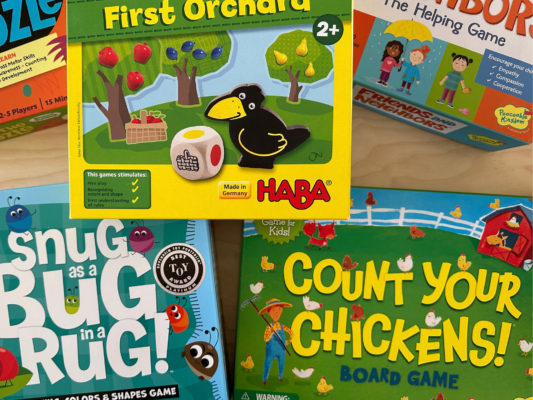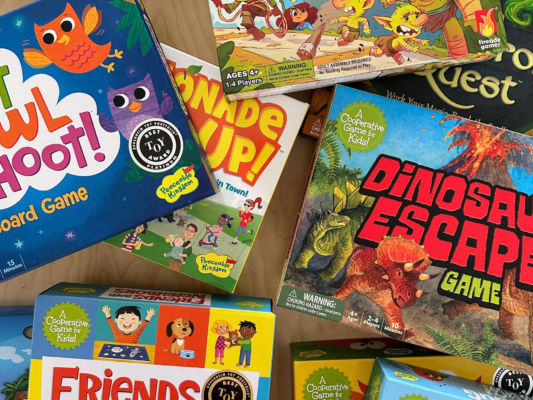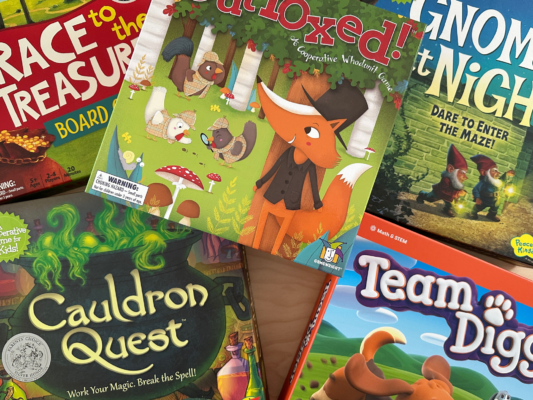Why Play Cooperative Board Games with Kids: Building Skills and Strengthening Bonds.
This post may contain affiliate links. As an Amazon Associate and participant in other affiliate programs, I earn a small commission on qualifying purchases (at no additional cost to you). Thank you for your support! Read our disclosure policy here.
Cooperative games offer a unique and valuable way for children to learn while having fun. In this article, I will explore the benefits of playing cooperative games with kids and how these games can help develop important skills, foster teamwork, and strengthen relationships. Read below to find out cooperative games are a fantastic choice for children of all ages!
Benefits of Cooperative Board Games for Kids:
1. Cooperative Board Games Promote Collaboration and Teamwork
One of the biggest benefits of cooperative board games is that they encourage all players to work together towards a common goal. By playing these games, kids learn the importance of collaboration, communication, and teamwork. They develop essential social skills such as listening, sharing ideas, and supporting each other.
2. Cooperative Board Games Build Problem-Solving Skills
Cooperative board games often present challenges that require players to think critically and play strategically. Children learn to problem-solve alongside the other players, they brainstorm and discuss ideas, they take into consideration different perspectives, and they work together to overcome obstacles. Being able to think critically and problem-solve are important skills for young children learn and skills they will use throughout their lives.
3. Cooperative Board Games Encourage Communication
Playing cooperative board games are a great opportunity for kids practice effective communication skills. When playing cooperative games, players often discuss possible moves and their potential outcomes. When disagreements arise during gameplay, kids learn to express their thoughts respectfully, listen to others’ viewpoints, and find mutually beneficial solutions. These skills are essential for building healthy relationships and resolving conflicts peacefully.
4. Cooperative Board Games Boost Self-Esteem and Confidence
Cooperative board games offer opportunities for children to contribute their ideas, make decisions, and take on leadership roles within the group. By actively participating and collaborating with others, kids build self-esteem, confidence, and a sense of accomplishment. When playing cooperative games, children gain support from the other players and they learn to value their unique strengths and contributions, which in turn, fosters a positive self-image and builds confidence.
How to Choose Cooperative Board Games to Play with Kids:
1. Select Age-Appropriate Games
When choosing cooperative board games for kids, consider the age and developmental stage of the players. You want to select games that offer a suitable level of challenge and complexity while still being engaging and fun. My oldest son just turned 6 years old and I have put together articles on cooperative games by age for 3, 4, and 5 year olds (see below). Use these ages as loose guidelines, for example, the games on the list for 5-year-olds will also be fun and engaging for older children!
3 Cooperative Games for 3-year-olds
4 Cooperative Games for 4-year-olds
5 Cooperative Games for 5-year-olds
2. Emphasize Fun and Enjoyment
Above all, playing board games are meant to be FUN! Playing board games are a time for families to connect; children can work on developing skills and also learn new ones. Cooperative games are especially great at keeping the focus of gameplay on having fun, because cooperative games remove the competitiveness of players playing against one another. Cooperative games emphasize teamwork, and are a great opportunity to build stronger bonds amongst players. While playing cooperative games with my family, there is often supportive discussions and lots of laughter!
Conclusion
Playing cooperative board games with kids is a fantastic way to promote collaboration, teamwork, problem-solving, empathy, and self-esteem. These games offer a fun and engaging way for children to learn new skills, strengthen social connections, and have a great time together. As a parent, nothing is better than witnessing your child learn and develop new skills, while also enjoying time together and maintaining strong family bonds! I encourage you to choose a cooperative board game, sit down with your children and have FUN!
Check out these posts for cooperative board games to play with young kids:
3 Cooperative Board Games for 3-year-olds
4 Cooperative Board Games for 4-year-olds
5 Cooperative Board Games for 5-year-olds



